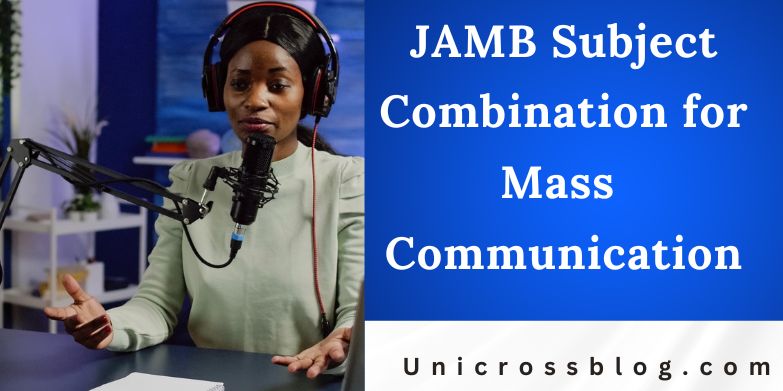Mass Communication stands as one of the most vibrant and sought-after courses in Nigerian universities. It equips students with the skills to shape public opinion, tell stories, and navigate the fast-paced world of media. From crafting compelling news reports to designing viral social media campaigns, this field opens doors to careers in journalism, broadcasting, public relations, advertising, and digital content creation. As Nigeria’s media landscape evolves with digital platforms and global influences, the demand for well-trained communicators continues to grow. If you dream of influencing discourse or entertaining audiences, understanding the JAMB subject combination is your first crucial step toward admission.
The Joint Admissions and Matriculation Board (JAMB) sets clear guidelines to ensure candidates are prepared for the rigors of this program. Choosing the wrong subjects can lead to automatic disqualification during screening, no matter how high your scores are. This guide breaks down everything you need: the required subjects for UTME, O’Level prerequisites, direct entry options, and tips to boost your chances. By aligning your preparation with these requirements, you position yourself for success in the 2025/2026 academic session.

UTME Subject Combination for Mass Communication
For the Unified Tertiary Matriculation Examination (UTME), JAMB mandates four subjects, with Use of English as the compulsory core. This reflects the emphasis on language proficiency, as Mass Communication revolves around clear, persuasive expression. The full combination is:
- Use of English (compulsory for all candidates).
- Any three subjects from Arts or Social Sciences.
Recommended choices within Arts and Social Sciences include Literature in English, Government, History, Christian Religious Studies (CRS), Islamic Religious Studies (IRS), Economics, or Commerce. Literature in English is particularly vital, as it hones analytical reading and writing skills essential for analyzing media texts and crafting narratives. Government or History builds understanding of societal structures, politics, and current affairs, which form the backbone of journalism and public relations. CRS or IRS adds depth to ethical discussions in media, while Economics or Commerce introduces concepts of marketing and advertising.
Why this combination? Mass Communication demands a blend of creativity, critical thinking, and social awareness. Unlike science-heavy courses, it favors humanities to foster empathy and cultural insight. Aim for at least 180 in your UTME score, though top universities like the University of Lagos (UNILAG) or Ahmadu Bello University (ABU) often require 250 or higher due to competition.
O’Level Requirements
Before tackling UTME, secure your foundation with Senior Secondary Certificate Examination (SSCE) results from WAEC, NECO, GCE, or NABTEB. You need at least five credit passes in not more than two sittings. The must-have subjects are:
- English Language.
- Literature in English.
- Mathematics.
- Any two Arts or Social Science subjects (such as Government, History, CRS, IRS, Economics, or Civic Education).
Mathematics, though not in UTME, is non-negotiable for O’Level because it sharpens logical reasoning for data-driven reporting and media analytics. Literature in English is key for narrative construction, and English ensures baseline communication competence. The two additional subjects should align with your strengths; for instance, Government for political journalism aspirants or Economics for advertising enthusiasts.
Pro tip: If you have one sitting with all credits, it strengthens your application during post-UTME screenings. Universities verify these rigorously, so authenticity matters.
Direct Entry Requirements
Not starting from scratch? Direct Entry (DE) allows holders of advanced qualifications to bypass Year One. JAMB requires:
- Two A’Level passes, including Literature in English and one other Arts or Social Science subject.
- National Diploma (ND) or Higher National Diploma (HND) in Mass Communication or related fields like Journalism, with at least a Lower Credit.
- Nigeria Certificate in Education (NCE) with Merit passes in relevant subjects.
- Interim Joint Matriculation Board (IJMB) or Joint Universities Preliminary Examinations Board (JUPEB) results with strong grades in compatible subjects.
DE candidates still need O’Level credits as listed above. This pathway suits polytechnic graduates seeking degree upgrades. Expect to apply via JAMB’s DE portal and meet the host university’s cut-off, often around 200.
Special Considerations and Common Mistakes
While the combination is standard, nuances exist. Some universities, like UNILAG, prioritize Literature and Government in screenings. Always cross-check the JAMB brochure for your target school, as slight variations occur. Avoid pitfalls like selecting Biology or Physics; these are irrelevant and could signal mismatched interests.
Post-UTME often includes essays or interviews testing communication flair, so practice articulating ideas. Change of course is possible pre-UTME if needed, but it’s better to get it right initially.
Career Prospects in Mass Communication
Beyond admission, Mass Communication promises diverse paths. Graduates become journalists at outlets like Channels TV or The Punch, broadcasters on radio stations, or PR specialists for brands like MTN. Digital roles in content strategy for TikTok influencers or social media managers for NGOs are booming. With Nigeria’s youthful population and rising internet penetration, opportunities in podcasting, film production, and corporate communications abound. Entry-level salaries range from N150,000 monthly, scaling to millions for top anchors or executives. Freelance writing or consulting adds flexibility. The field rewards adaptability; upskill in SEO, video editing, or data journalism to stand out.
Preparation Tips
Start early: Build vocabulary through daily reading of newspapers like Vanguard. Practice past UTME questions to master time management. Join debate clubs for oral skills. Balance study with mock exams to hit that target score. Remember, passion fuels persistence; visualize your byline in a major publication.
In summary, mastering the JAMB subject combination for Mass Communication is about more than checkboxes. It is your gateway to a dynamic career influencing millions. With dedication, the right subjects, and strategic preparation, your media journey awaits.
READ ALSO: Updated JAMB Areas of Concentration for Literature in English 2026/2027
FAQs
Is Literature in English compulsory for Mass Communication in JAMB UTME?
Yes, it is highly recommended and often required by universities. It is part of the three Arts/Social Science subjects and essential for O’Level credits.
Can I study Mass Communication without Mathematics in O’Level?
No, a credit in Mathematics is mandatory for O’Level admission into most universities.
What is the minimum JAMB score for Mass Communication?
The general cut-off is 180, but competitive schools like UNILAG demand 250 or above.
Is Government a must in the UTME combination?
No, but it is a strong choice alongside Literature and Economics for relevance to media studies.
Can I apply for Direct Entry with an ND in a different field?
Only if related, like Business Administration with communication focus; otherwise, stick to UTME.







